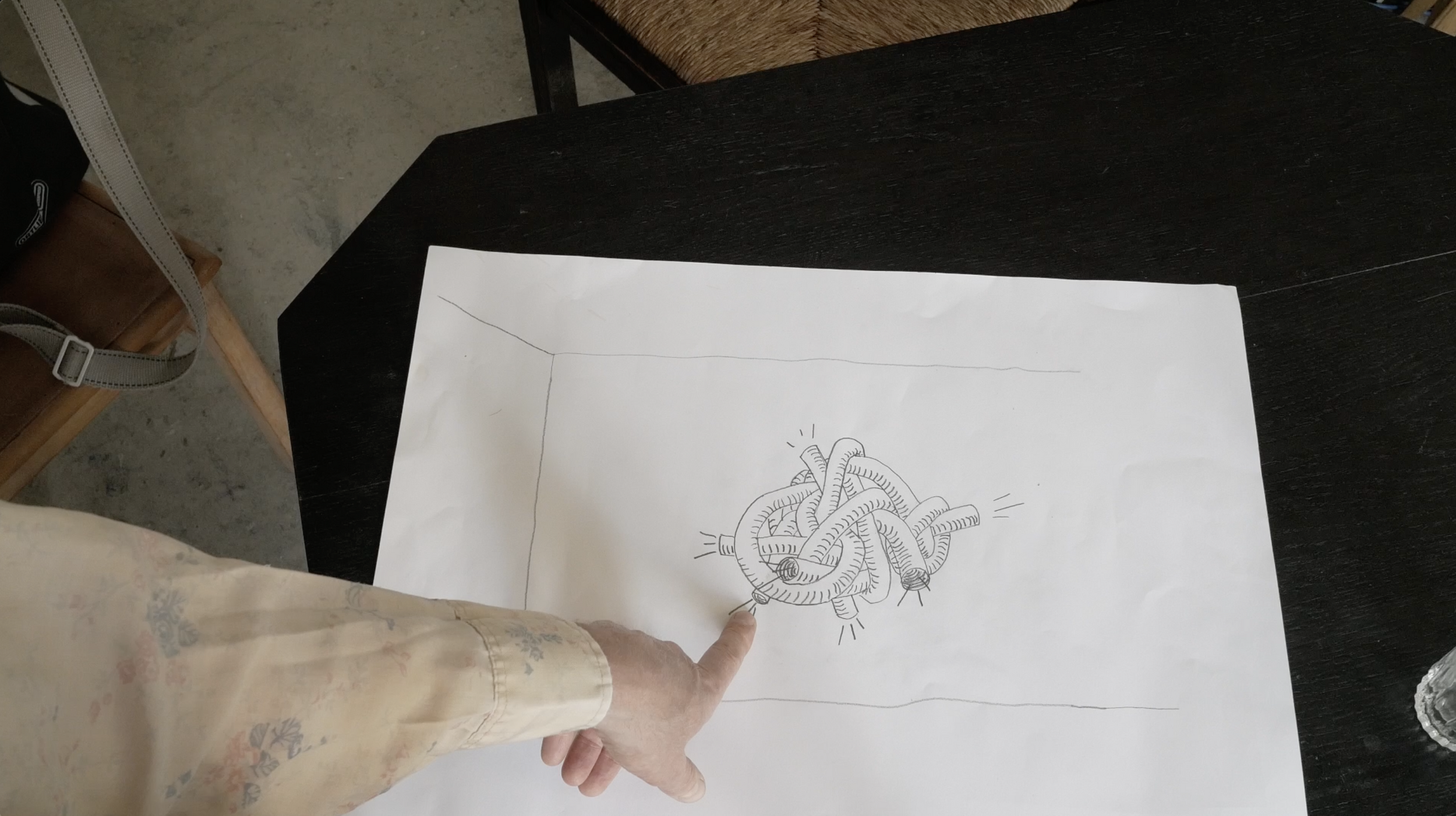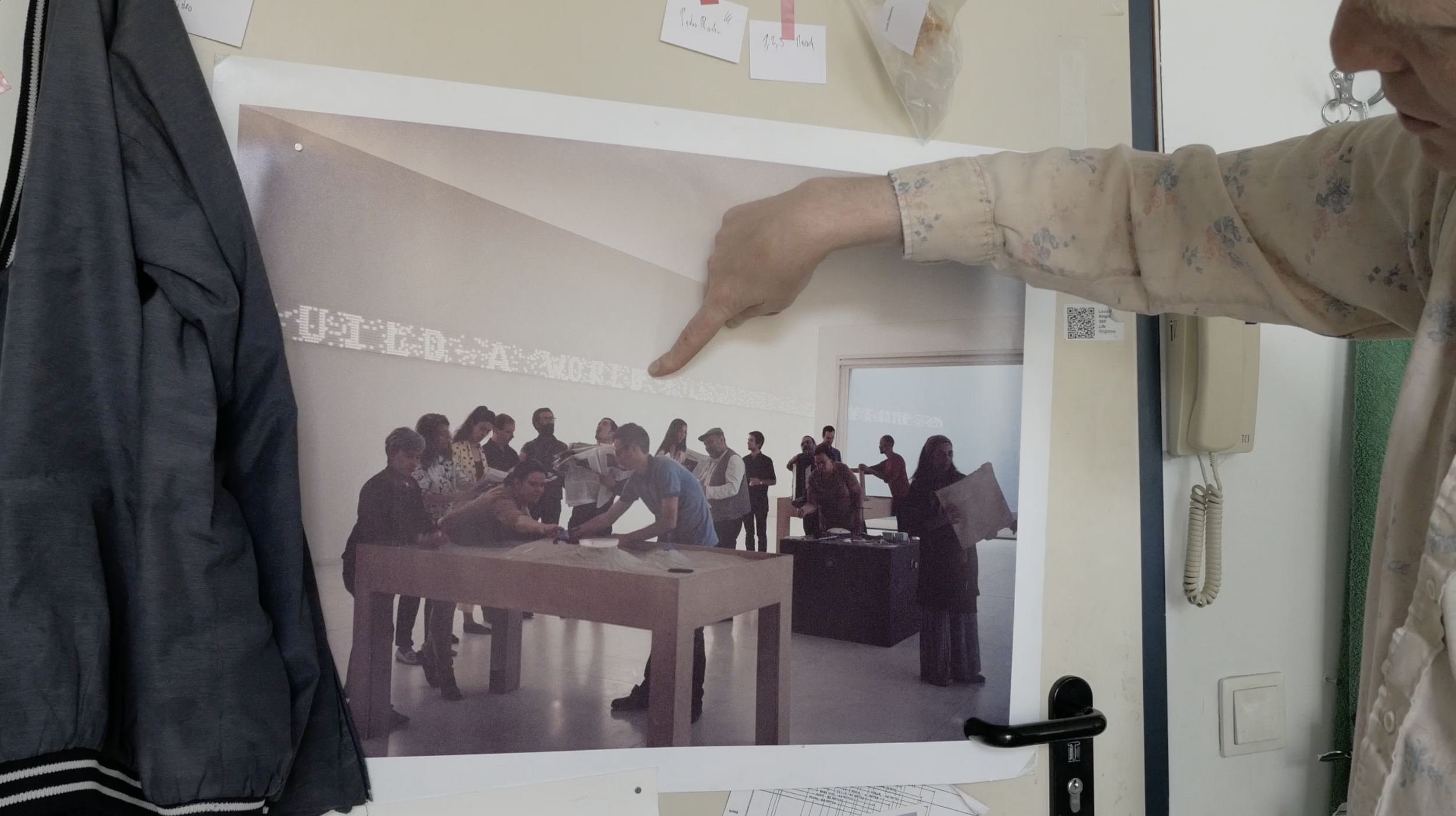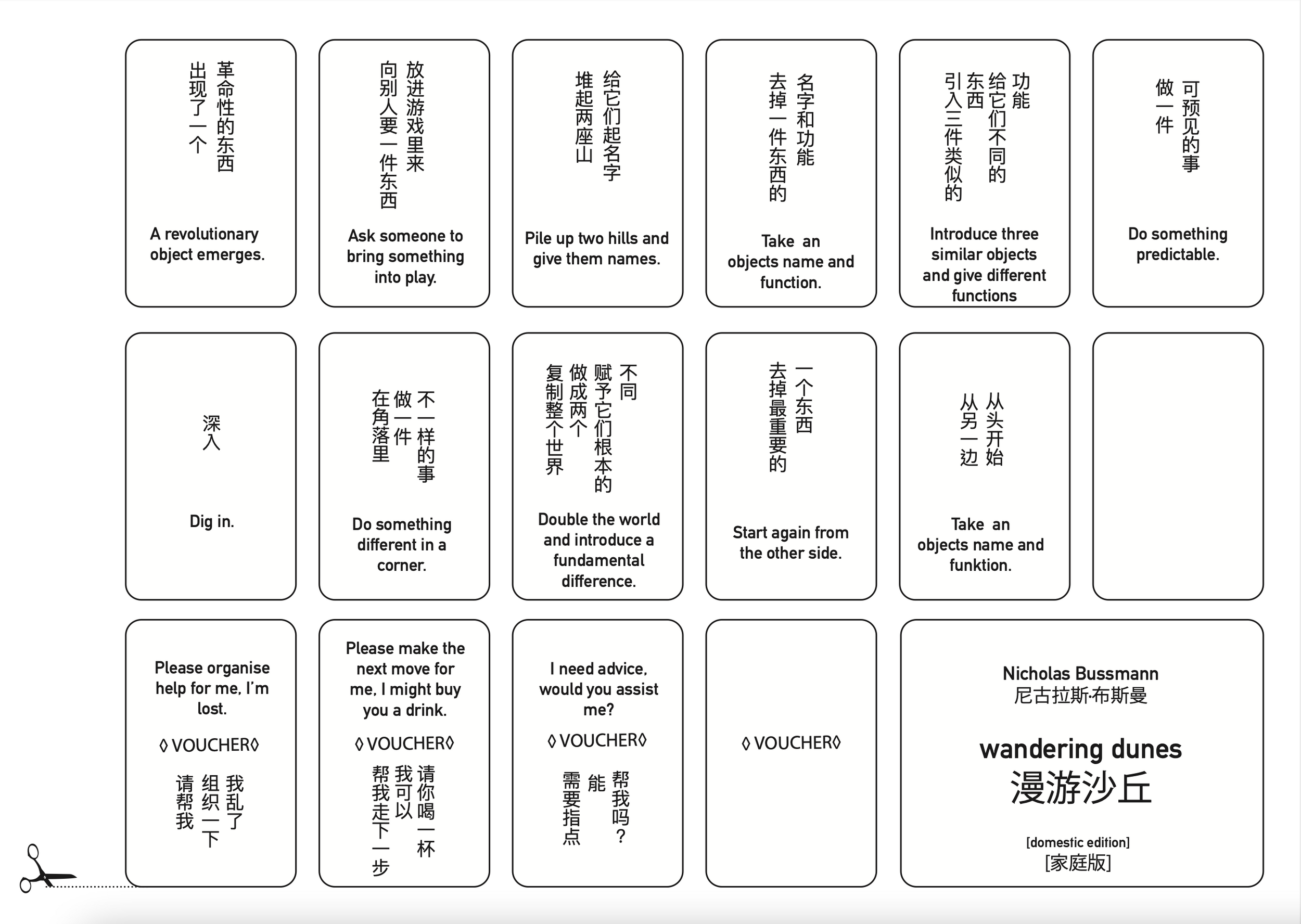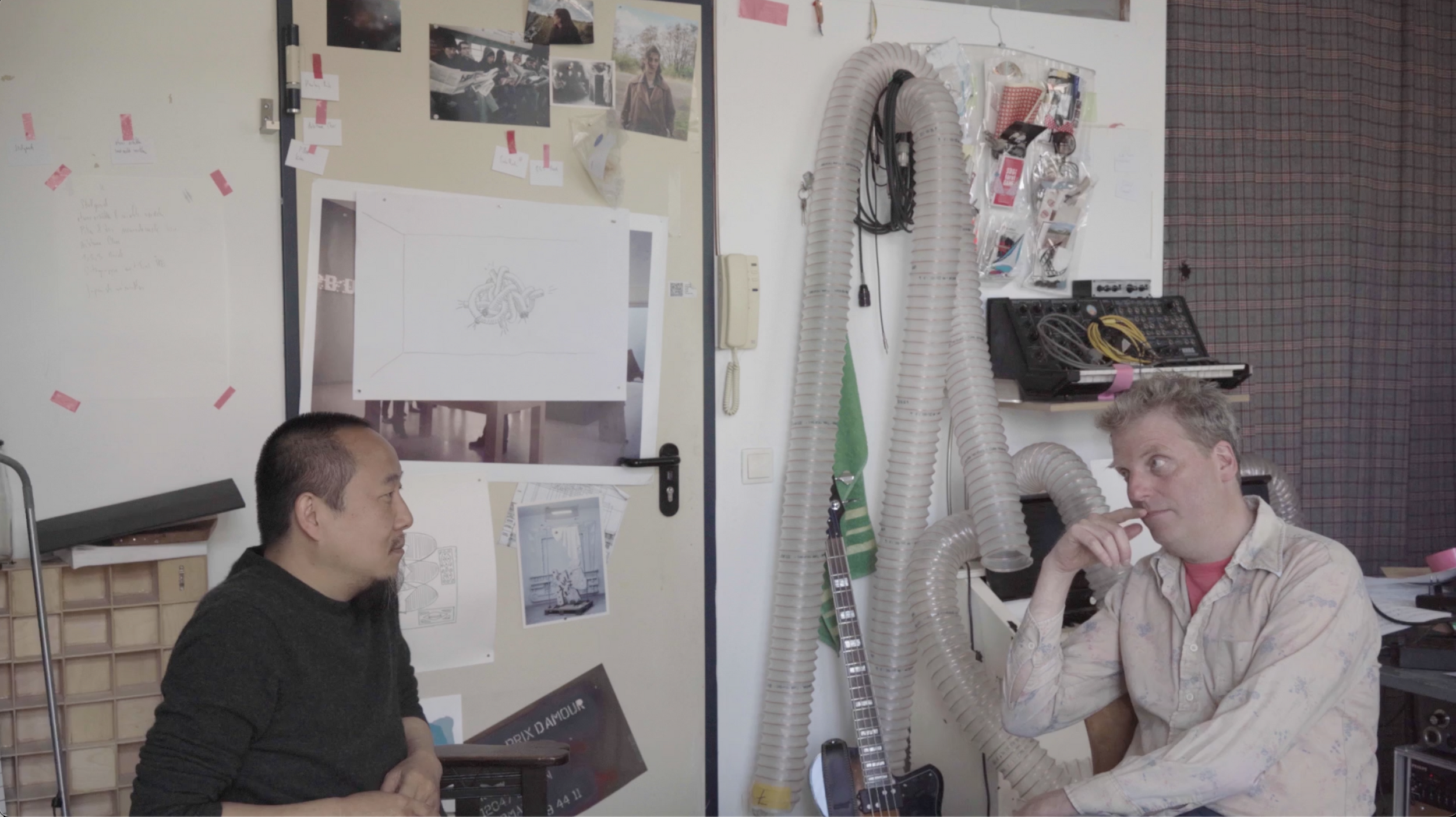︎Inner Ear
Nicholas Bussmann: I Do Games that Have Nothing to Win or Lose, It’s Just a Possibility.
Original video version was first presented at
JUT Museum’s “Lives” Exhibition Artist Talk on June 18, 2022
Text edited by Ficus X
中文訪談請按此
”Most of the time, when we search, we search for something we have lost. Sometimes we search for something we have yet to find. There are different ways of looking for something, different techniques for something we have lost than for something we have yet to find. At this moment you see me searching and it looks like I am searching for something I have lost. That is not true, I am just behaving like I am searching for something. I move around and try to imagine there might be something, but there is nothing I am searching for. “
—— Nicholas Bussmann

Sketch of Oral Archive of the Future Dead.

Photo of installation Wandering Dunes, Bussman points towards the words “Build a World”
Bussmann: This is the sketch of the Oral Archive of the Future Dead. This is the breathing of my mom, this is the breathing of a very good friend of mine, this is my youngest child’s breathing, and I don’t know who this other person is. This is a stranger who was asked to breathe, and this is my love.
This [other] photo or a tableau vivant is of my installation and game Wandering Dunes, [which] consists of three sandbox tables, and a table with props you can play with. [On the Wall], there is an LED that creates an always changing light situation for the whole room. [The light spells] the sentence, “Build a world.”
That is what the game is about--to imagine and change the world. It is a game of two phases-- the first phase is about building a world, the second phase is about pushing time forward and in that moment, the change has to happen because time is just floating and going on and on. Change happens [while pursuing] questions of what happens, what is next, and happens after that. Here, between the tables, you see people who are holding newspapers and singing.
This is a choir singing the news. The Cottbusser choir, my multilingual choir. We developed a set of three algorithms together to sing the news. Major news / minor news, secret news, and the news blues. This became a part of the Wandering Dunes.
The new performance I am right now developing is basically growing out of Wandering Dunes, it is a work about marching together, and about basically the collective body and the body of the state.
I am a musician and I have spent most of my life doing music in concerts and recordings. It has been just seven years since I moved my work focus towards art. Music has one speciality, you can act, you can sing, you can play while you hear. You don’t have to deal with the semantics of a language, nor do you have to listen or completely understand. There is the synchronicity of action and reaction, between absorbing and giving at the same time. These techniques, which are special to music, in some ways can be translatable or used in different ways for forms of game structure.
I am very much interested in games structures, but I am not interested in games. I am not in awe of the idea of competitiveness, or what you believe games should be. I do games that have nothing to win and nothing to lose, it’s just a possibility.
This [other] photo or a tableau vivant is of my installation and game Wandering Dunes, [which] consists of three sandbox tables, and a table with props you can play with. [On the Wall], there is an LED that creates an always changing light situation for the whole room. [The light spells] the sentence, “Build a world.”
That is what the game is about--to imagine and change the world. It is a game of two phases-- the first phase is about building a world, the second phase is about pushing time forward and in that moment, the change has to happen because time is just floating and going on and on. Change happens [while pursuing] questions of what happens, what is next, and happens after that. Here, between the tables, you see people who are holding newspapers and singing.
This is a choir singing the news. The Cottbusser choir, my multilingual choir. We developed a set of three algorithms together to sing the news. Major news / minor news, secret news, and the news blues. This became a part of the Wandering Dunes.
The new performance I am right now developing is basically growing out of Wandering Dunes, it is a work about marching together, and about basically the collective body and the body of the state.
I am a musician and I have spent most of my life doing music in concerts and recordings. It has been just seven years since I moved my work focus towards art. Music has one speciality, you can act, you can sing, you can play while you hear. You don’t have to deal with the semantics of a language, nor do you have to listen or completely understand. There is the synchronicity of action and reaction, between absorbing and giving at the same time. These techniques, which are special to music, in some ways can be translatable or used in different ways for forms of game structure.
I am very much interested in games structures, but I am not interested in games. I am not in awe of the idea of competitiveness, or what you believe games should be. I do games that have nothing to win and nothing to lose, it’s just a possibility.
︎
Yan Jun Surpise Visit at Bussmann’s Studio

Wandering Dunes Domestic Version in collaboration with Yan Jun (https://grandprixdamour.com/Wandering-Dunes)
[The studio door opens, Yan Jun enters]
Bussmann (B): You didn’t knock.
Yan Jun (Y): We don’t.
B: Ah yeh, you just come in. I was surprised.
Y: That's okay, don’t be surprised. We need to do more meditation to reduce surprise and sudden reaction.
B: Is more meditation good for the music?
Y: It’s very good for the audience.
B: For the audience, yes, but for the musician, I’m not so sure.
Y: That’s okay, if your whole audience does meditation, you can do whatever you like.
B: But look, in the very end, you will end up doing what John Cage did, rolling the dice. We all become listeners and no action is necessary anymore.
Y: Okay, but I’m still talking about the audience. If you make your audience do meditation, you can play anything, and they will appreciate it.
B: That’s true.
Y: John Cage, I don’t know if he did meditation. Maybe he did it everyday, or maybe once a year.
B: I don’t know much about John Cage. As far as he said, he did it a lot, but he probably did it bad. [Refrains] I actually hardly know his name.
Y: I know his name very often, if you need one symbol in one realm, here is John Cage, here you have Jimi Hendrix, here you have Merzbow, here Joseph Beuys, and Michael Jackson there. Then you have everything.
B: It’s all men.
Y: Yes, yes..
[long pause]
B: So why do you make music?
Y: I was a music critic, I wrote a lot about music. But one day I realized all these people, 100%, or 99% of them just disappeared. They either stopped, disbanded, left, or just took a break. The scene was finished, so I had to do something. And also I didn’t want to write in this way as if, I know everything, the music critic has to know everything, but actually I don’t know everything, it is very difficult to play that role.
B: I understand, I wouldn't want to be a curator, because you need to know so much if you want to be good, and I’m not interested in knowing so much about music or art. I know a little and I know things that I like a lot, and I sometimes listen to certain things hundreds of times, while [there are] others I never unwrap.
Y: That is good for you. You don’t need the things you don’t need
B: Yes, it gives space. Also, it’s a territorial thing to have this knowledge about all the things, to be really informed. But I’m not really interested in knowing a territory, I’m alright with just observing how I move around in this field. I’m more interested in how I am trying to change the way I’m moving, than I know I’m moving in a certain direction to be part of another territory.
Y: So can I say, if you make a piece of art, you still keep a part of the art unknown.
B: Yes, but in art as well as in music, you know, I don’t really give a shit about the physical existence of it. The physical is just another tool, another instrument, it has no meaning.
Y: But in a music convention, people say you have to know your instrument and your material very well.
B: The topic of virtuosity is very strong in music, to really know your skills and be one of the best at it. I think virtuosity is very boring and overrated, because most of the things which interest me happen in relation to the audience and the performer, or between the performers, or between the audiences.
For instance, in art, there are people who visit an exhibition together and their interactions [are an instance of] things that interest me. [Coming back] to the idea of virtuosity, it is a way to claim superiority in a hierarchy, to claim that you are better than the others.
In a certain way it is true that you cannot escape virtuosity. [In life], you are always pushed in a direction of how people see you. ‘Ah, he can do this very good,’ ‘He is a very good singer,’ and suddenly, you are being moved into the direction of a professional cougher. ‘You coughed excellently in the last concert.’
Y: To become a professional cough artist, professional crying artist.
B: Yes there are people who are professional crying artists, I think it is a great profession.
Y: That’s different from a professional cello player, and you are a great cello improviser, how did you stop going in this direction?
B: I didn’t give up, I still play, I just play much less. It moved into a different place. It’s a difficult question, I adore the people who stick with their instrument and explore over a long time with many different people the vocabularies they can do with this instrument.
But then the idea of virtuosity comes up, you can’t escape it, you are doing this thing with one instrument, and you are getting better at it, and you are doing special techniques and so on, then you are a specialist doing something special in a special way. I think that is a bit of a trap.
Y: How about robots? There is one guy in Berlin who uses a robot to play piano. He’s the best.
B: You can’t say that really, it is impossible with robots. They are always at maximum possibility, it is always a failure.
Y: But it’s the best failure.
B: It’s a very good failure, because it is built for virtuosity. Well that’s not really true, because it may also get very hot from doing really fast stuff for a very long time. And then it has to slow down. So it also has some kind of fatigue of the muscles.
Bussmann (B): You didn’t knock.
Yan Jun (Y): We don’t.
B: Ah yeh, you just come in. I was surprised.
Y: That's okay, don’t be surprised. We need to do more meditation to reduce surprise and sudden reaction.
B: Is more meditation good for the music?
Y: It’s very good for the audience.
B: For the audience, yes, but for the musician, I’m not so sure.
Y: That’s okay, if your whole audience does meditation, you can do whatever you like.
B: But look, in the very end, you will end up doing what John Cage did, rolling the dice. We all become listeners and no action is necessary anymore.
Y: Okay, but I’m still talking about the audience. If you make your audience do meditation, you can play anything, and they will appreciate it.
B: That’s true.
Y: John Cage, I don’t know if he did meditation. Maybe he did it everyday, or maybe once a year.
B: I don’t know much about John Cage. As far as he said, he did it a lot, but he probably did it bad. [Refrains] I actually hardly know his name.
Y: I know his name very often, if you need one symbol in one realm, here is John Cage, here you have Jimi Hendrix, here you have Merzbow, here Joseph Beuys, and Michael Jackson there. Then you have everything.
B: It’s all men.
Y: Yes, yes..
[long pause]
B: So why do you make music?
Y: I was a music critic, I wrote a lot about music. But one day I realized all these people, 100%, or 99% of them just disappeared. They either stopped, disbanded, left, or just took a break. The scene was finished, so I had to do something. And also I didn’t want to write in this way as if, I know everything, the music critic has to know everything, but actually I don’t know everything, it is very difficult to play that role.
B: I understand, I wouldn't want to be a curator, because you need to know so much if you want to be good, and I’m not interested in knowing so much about music or art. I know a little and I know things that I like a lot, and I sometimes listen to certain things hundreds of times, while [there are] others I never unwrap.
Y: That is good for you. You don’t need the things you don’t need
B: Yes, it gives space. Also, it’s a territorial thing to have this knowledge about all the things, to be really informed. But I’m not really interested in knowing a territory, I’m alright with just observing how I move around in this field. I’m more interested in how I am trying to change the way I’m moving, than I know I’m moving in a certain direction to be part of another territory.
Y: So can I say, if you make a piece of art, you still keep a part of the art unknown.
B: Yes, but in art as well as in music, you know, I don’t really give a shit about the physical existence of it. The physical is just another tool, another instrument, it has no meaning.
Y: But in a music convention, people say you have to know your instrument and your material very well.
B: The topic of virtuosity is very strong in music, to really know your skills and be one of the best at it. I think virtuosity is very boring and overrated, because most of the things which interest me happen in relation to the audience and the performer, or between the performers, or between the audiences.
For instance, in art, there are people who visit an exhibition together and their interactions [are an instance of] things that interest me. [Coming back] to the idea of virtuosity, it is a way to claim superiority in a hierarchy, to claim that you are better than the others.
In a certain way it is true that you cannot escape virtuosity. [In life], you are always pushed in a direction of how people see you. ‘Ah, he can do this very good,’ ‘He is a very good singer,’ and suddenly, you are being moved into the direction of a professional cougher. ‘You coughed excellently in the last concert.’
Y: To become a professional cough artist, professional crying artist.
B: Yes there are people who are professional crying artists, I think it is a great profession.
Y: That’s different from a professional cello player, and you are a great cello improviser, how did you stop going in this direction?
B: I didn’t give up, I still play, I just play much less. It moved into a different place. It’s a difficult question, I adore the people who stick with their instrument and explore over a long time with many different people the vocabularies they can do with this instrument.
But then the idea of virtuosity comes up, you can’t escape it, you are doing this thing with one instrument, and you are getting better at it, and you are doing special techniques and so on, then you are a specialist doing something special in a special way. I think that is a bit of a trap.
Y: How about robots? There is one guy in Berlin who uses a robot to play piano. He’s the best.
B: You can’t say that really, it is impossible with robots. They are always at maximum possibility, it is always a failure.
Y: But it’s the best failure.
B: It’s a very good failure, because it is built for virtuosity. Well that’s not really true, because it may also get very hot from doing really fast stuff for a very long time. And then it has to slow down. So it also has some kind of fatigue of the muscles.

Yan Jun & Nicholas Bussmann in studio.
(Update: 2022-06-26)
︎ Nicholas Bussmann
Nicholas Bussmann is an artist and musician. With a biographical background in Improvised Music, he creates conceptual frameworks and concrete scenarios for collective performances. At the center of his interest lies the ight and historically rooted connection between music, social practice and socialization.
https://www.discogs.com/artist/394378-Nicholas-Bussmann
Nicholas Bussmann is an artist and musician. With a biographical background in Improvised Music, he creates conceptual frameworks and concrete scenarios for collective performances. At the center of his interest lies the ight and historically rooted connection between music, social practice and socialization.
https://www.discogs.com/artist/394378-Nicholas-Bussmann
Nicholas Bussmann 是一位具有即興音樂創作背景的藝術家和音樂家,擅長未集體表演創造概念架構於具體場景。他最感興趣的是音樂、社會事件、以及社會化之間緊密且具有歷史淵源的連結。
︎ Yan Jun
a musician and poet based in beijing.
he works on experimental music and improvised music. he uses noise, field recording, body and concept as materials.
sometimes he goes to audience’s home for playing a plastic bag.
“i wish i was a piece of field recording.”
yanjun.org
www.subjam.org
a musician and poet based in beijing.
he works on experimental music and improvised music. he uses noise, field recording, body and concept as materials.
sometimes he goes to audience’s home for playing a plastic bag.
“i wish i was a piece of field recording.”
yanjun.org
www.subjam.org
︎ 顏峻
樂手,詩人,住在北京。從事實驗音樂和即興音樂,使用噪音、田野錄音、身體、概念作為素材。他的作品通常很簡單,沒有什麼技巧,也不像音樂。有時候會去觀眾家演奏塑料袋。
“我希望我是一份田野錄音。”
樂手,詩人,住在北京。從事實驗音樂和即興音樂,使用噪音、田野錄音、身體、概念作為素材。他的作品通常很簡單,沒有什麼技巧,也不像音樂。有時候會去觀眾家演奏塑料袋。
“我希望我是一份田野錄音。”

